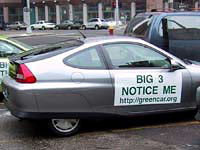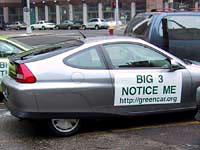Judging by the media hype over Ford’s and General Motors’ early January announcements on “hybrid” vehicles at the North American International Auto Show, one would think that automakers have seen the light and are finally matching their professed concern for the environment with deeds.
Hybrid cars deliver better fuel efficiency by using two power sources — a gasoline engine and an electric motor. But true environmental gains are not measured in press releases. Detroit’s paltry commitment to sell a few tens of thousands of cleaner cars four years from now will hardly make a dent in reducing the emission of greenhouse gases that cause global climate change. Sadly, the Big Three automakers (Ford, GM, and Chrysler) are also the Big Three polluters. They sell more vehicles that are more polluting than almost all other automakers. Indeed, the average greenhouse gas emissions of their passenger vehicles have actually increased since 1989.
A Dash Here, a Pinch There
So what exactly did Detroit commit to at the hometown Auto Show? Ford announced that it will offer a new fuel-saving technology in 2004 on its best-selling Explorer SUV; the technology, which has the potential to improve fuel economy by 10 to 15 percent, will be available as an option for about $1,000. (Ford had previously announced that it will sell a hybrid version of its new SUV, the Escape, starting in 2003; the hybrid version will get up to 40 miles per gallon and cost about $3,000 extra.) GM, in its most sweeping announcement to date on hybrid vehicles, said its “ParadiGM” hybrid system will be offered on a number of different models starting in 2004.
These commitments to move greener auto technology from blackboard to blacktop are a promising sign. While Detroit is still well behind Toyota and Honda in bringing hybrid cars to market, it does appear that the Big Three are at least heeding the call from environmentalists — and increasingly from consumers — to build cars that tread more lightly on the planet. Interestingly, Ford’s and GM’s announcements came a day after Greencar.org — developed by a coalition of environmental groups including the Natural Resources Defense Council — culminated a year-long petition drive, delivering to automakers 150,000 letters demanding substantially cleaner automobiles.
Detroit, then, has not turned a completely deaf ear to the call for cleaner cars. But a few greener vehicles, aimed at a boutique market, will not save the planet. One might well suspect that the real reason Detroit is getting into the green vehicle market is to burnish its corporate logos and assuage consumer guilt over SUV purchases.
Automakers sold 17 million passenger vehicles last year, almost half of which were polluting and fuel-inefficient SUVs, pickups, and minivans. GM reportedly believes it will be able to sell 20,000 hybrids in 2004 and as many as 100,000 by 2010. But GM sold almost 5 million vehicles last year, nearly half of them SUVs and other light trucks. So the impact of the anticipated hybrid sales would be to raise GM’s overall average fuel economy by about 0.1 percent in 2004 and 0.5 percent by 2010. The latter figure amounts to an increase in fuel efficiency of a mere 0.1 miles per gallon across the GM fleet. Hardly the stuff of heady environmentalism.
The internal combustion engine is a 19th-century invention. In announcing their intention to manufacture and sell hybrids, the Big Three automakers have taken an important step forward. But this is only the first step of a journey into the 21st century, a time when new technologies promise to help solve environmental problems. To survive, hybrids and other alternative technologies must become more than a “green halo” used to polish the automakers’ public image. If Detroit does not fundamentally restructure itself around fuel-efficient, pollution-reducing technologies, the automakers may find themselves going the way of the horse-and-buggy. And they may take the planet with them.



